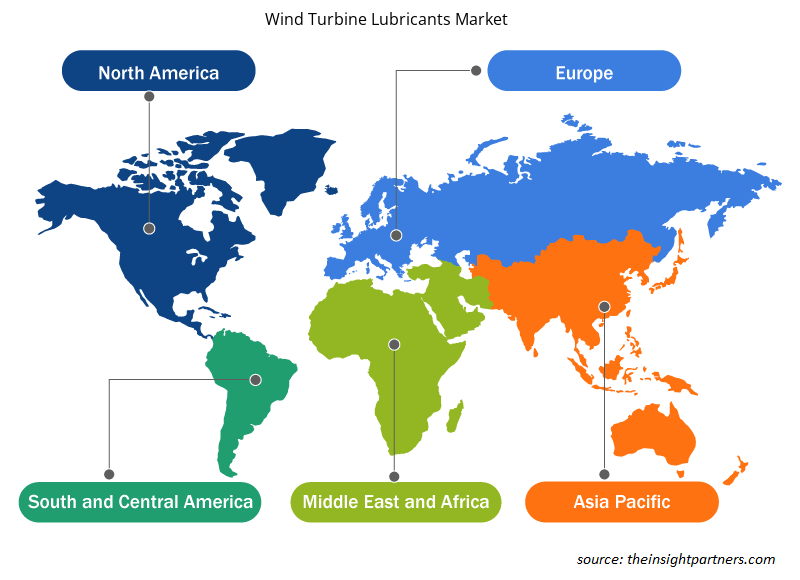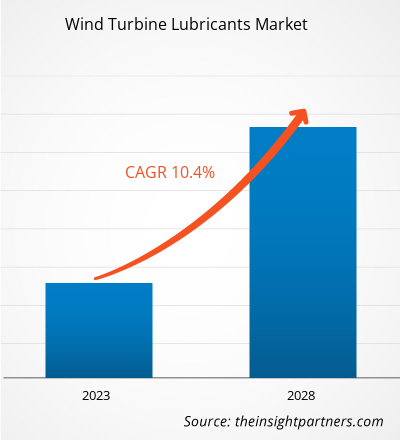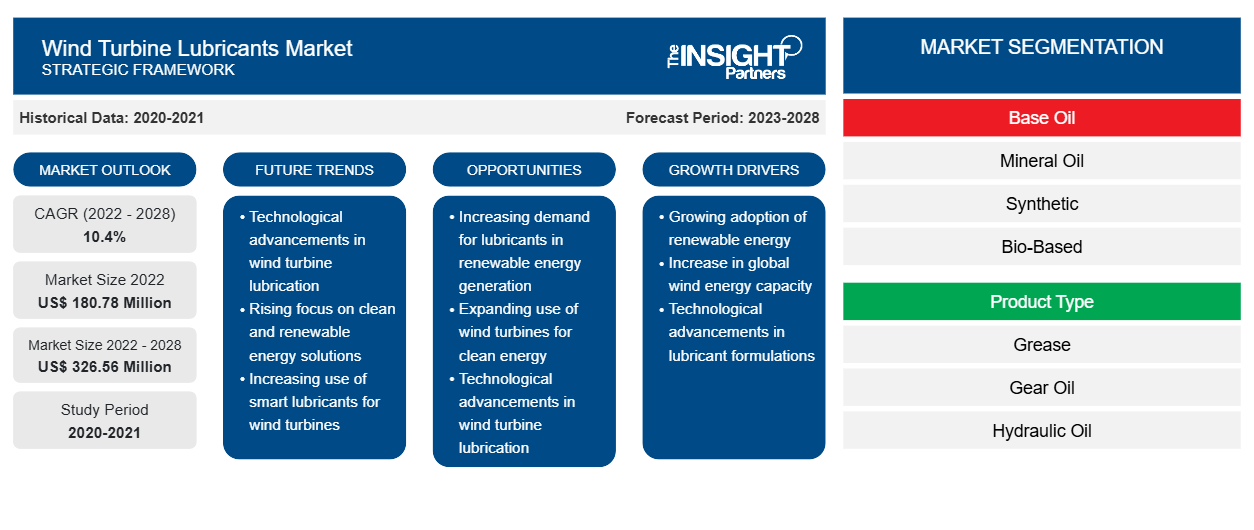[Forschungsbericht] Der Markt für Schmierstoffe für Windturbinen soll von 180,78 Millionen US-Dollar im Jahr 2022 auf 326,56 Millionen US-Dollar im Jahr 2028 wachsen; von 2022 bis 2028 wird eine durchschnittliche jährliche Wachstumsrate (CAGR) von 10,4 % erwartet.
Schmierstoffe für Windturbinen spielen eine wichtige Rolle für Betrieb, Wartung und Zuverlässigkeit der Ausrüstung in Windparks. Windturbinen haben verschiedene Schmierstellen wie Getriebe, offenes Getriebe, Pitch-Getriebe, Pitch-Lager, Azimutlager, Hydrauliksysteme und Generatorlager. In Windturbinen werden verschiedene Schmierstoffe verwendet, darunter Getriebeöle, Hydrauliköle und Schmierfette. Getriebeöl wird zum Schmieren von Getrieben verwendet. In Windturbinen wird Schmierfett für das Hauptrotorwellenlager, das Azimutlager, die Pitch-Antriebsräder, das Rotorblattlager und das Generatorlager verwendet.
Der globale Marktanteil von Schmierstoffen für Windturbinen im asiatisch-pazifischen Raum war im Jahr 2022 der größte. Der Markt für Schmierstoffe für Windturbinen im asiatisch-pazifischen Raum ist in Australien, China, Indien, Japan, Südkorea und den Rest des asiatisch-pazifischen Raums unterteilt. China trägt maßgeblich zum Marktwachstum in dieser Region bei. Das Land ist seit mehr als einem Jahrzehnt der weltweit größte und am schnellsten wachsende Produzent erneuerbarer Energien. Darüber hinaus verfügt es über den weltweit größten Windenergiemarkt. China blieb im Jahr 2020 der weltweit größte Markt für neue Onshore-Anlagen, bedingt durch die Abschaltung der Einspeisevergütung (FiT). Auch Indien verzeichnete aufgrund verschiedener günstiger Richtlinien und Vorschriften der nationalen und staatlichen Regierungen ein bemerkenswertes Wachstum der Windkraftbranche. Darüber hinaus ergreifen Länder wie Taiwan, Südkorea, Vietnam und die Philippinen verschiedene Initiativen, um ihre installierten Windkapazitäten zu erhöhen, was die Nachfrage der Region nach Schmierstoffen für Windturbinen erhöht.
Passen Sie diesen Bericht Ihren Anforderungen an
Sie erhalten kostenlos individuelle Anpassungen an jedem Bericht, einschließlich Teilen dieses Berichts oder einer Analyse auf Länderebene, eines Excel-Datenpakets sowie tolle Angebote und Rabatte für Start-ups und Universitäten.
-
Holen Sie sich die wichtigsten Markttrends aus diesem Bericht.Dieses KOSTENLOSE Beispiel umfasst eine Datenanalyse von Markttrends bis hin zu Schätzungen und Prognosen.
Auswirkungen der COVID-19-Pandemie auf den Markt für Windkraftanlagenschmierstoffe
Die staatliche Förderung erneuerbarer Energien und der Anstieg der Windkraftanlageninstallationen haben maßgeblich zum Wachstum des Marktes für Windkraftschmierstoffe beigetragen. Im Jahr 2020 mussten jedoch verschiedene Branchen ihren Betrieb aufgrund von Störungen in der Wertschöpfungskette aufgrund der Beschränkungen nationaler und internationaler Grenzen verlangsamen. Dies führte zur Schließung von Produktionsanlagen, was sich Anfang 2020 negativ auf das Wachstum des Marktes für Windkraftschmierstoffe auswirkte. Der Rückgang der Windkraftanlageninstallationen Anfang 2020 bremste die Nachfrage nach Windkraftschmierstoffen.
Allerdings erholte sich der Windenergiesektor in der zweiten Jahreshälfte kräftig, als die reifen und aufstrebenden Windmärkte begannen, die Auswirkungen der Pandemie zu überwinden. Zudem erholte sich der Weltmarkt von den Verlusten, die zu Beginn der Pandemie erlitten worden waren, als die Regierungen verschiedener Länder Lockerungen der sozialen Einschränkungen ankündigten. Darüber hinaus führten die steigenden Impfraten zu einem förderlichen Umfeld für den industriellen Fortschritt. Laut dem Global Wind Energy Council verzeichnete die globale Windindustrie im Jahr 2020 ein Rekordwachstum von 53 % im Vergleich zum Vorjahr. Während des Höhepunktes der COVID-19-Pandemie installierte die Industrie trotz Störungen der globalen Lieferkette und der Projektkonstruktion mehr als 93 GW Windkraft . Der Anstieg der installierten Windkraftkapazität führte zu einer höheren Nachfrage nach Schmierstoffen für Windturbinen, da Schmierstoffe zur Schmierung verschiedener Teile von Windturbinen verwendet werden.
Markteinblicke
Steigende installierte Windkapazität steigert Nachfrage nach Schmierstoffen für Windturbinen
Windenergie trägt dazu bei, die Abhängigkeit von fossilen Brennstoffen zu verringern, was in verschiedenen Ländern zu einem zunehmenden Interesse an dieser erneuerbaren Ressource führt. Laut dem vom Global Wind Energy Council veröffentlichten „Global Wind Report 2021“ wurden im Jahr 2020 mehr als 90 GW neue Windkraftanlagen installiert, das sind 53 % mehr als die im Jahr 2019 hinzugekommene Kapazität. Daraus ergab sich eine weltweit installierte Gesamtkapazität von 743 GW, was einem Anstieg von 14 % gegenüber 2019 entspricht . Im Jahr 2020 erreichten die Neuinstallationen in Onshore-Windparks 86,9 GW, während die Offshore-Windparks 6,1 GW erreichten, womit 2020 das Jahr mit den höchsten bzw. zweithöchsten Zahlen in der Geschichte für neue Onshore- und Offshore-Windkraftanlagen war. Verschiedene Teile der Windturbine müssen mit Fetten, Getriebeölen, Hydraulikölen und anderen Schmiermitteln geschmiert werden. Daher treibt die weltweit steigende installierte Windkapazität das Wachstum des Marktes für Schmiermittel für Windturbinen voran.
Einblicke in Grundöle
Basierend auf Grundöl ist der globale Markt für Windturbinenschmierstoffe in Mineralöl, synthetische und biobasierte Schmierstoffe unterteilt. Das synthetische Segment hatte 2022 den größten Marktanteil bei Windturbinenschmierstoffen. Synthetische Schmierstoffe bestehen aus Ölkomponenten, die synthetisch durch die Reaktion einiger genau definierter chemischer Verbindungen hergestellt wurden, die oft auf Erdöl basieren und nicht aus vorhandenem Erdöl oder Pflanzenöl raffiniert wurden. Synthetische Schmierstoffe sind die am häufigsten verwendeten Schmierstoffe in der Windturbinenindustrie, da synthetische Öle einen niedrigeren Fließpunkt haben, wodurch das Getriebe bei niedrigeren Temperaturen effizient arbeiten kann.
Zu den wichtigsten Akteuren auf dem globalen Markt für Windturbinenschmierstoffe gehören TotalEnergies, Exxon Mobil Corporation, FUCHS, BP plc, Klüber Lubrication, Shell, Phillips 66 Company, Chevron, Afton Chemical, AMSOIL INC. und The Lubrizol Corporation. Die Akteure auf dem globalen Markt konzentrieren sich darauf, qualitativ hochwertige Produkte anzubieten, um die Kundennachfrage zu erfüllen. Dafür investieren sie erheblich in Forschungs- und Entwicklungsaktivitäten.
Bericht-Spotlights
- Fortschrittliche Branchentrends auf dem Markt für Windkraftschmierstoffe helfen den Akteuren bei der Entwicklung wirksamer langfristiger Strategien
- In Industrie- und Entwicklungsländern angewandte Strategien für Unternehmenswachstum
- Quantitative Analyse des Marktes für Windkraftanlagenschmierstoffe von 2020 bis 2028
- Schätzung der weltweiten Nachfrage nach Schmierstoffen für Windturbinen
- Porters Fünf-Kräfte-Analyse zur Veranschaulichung der Wirksamkeit der in der Branche tätigen Käufer und Lieferanten
- Aktuelle Entwicklungen zum Verständnis des Wettbewerbsmarktszenarios
- Markttrends und -aussichten sowie Faktoren, die das Wachstum des Marktes für Windkraftschmierstoffe vorantreiben und bremsen
- Unterstützung im Entscheidungsprozess durch Aufzeigen von Marktstrategien, die das kommerzielle Interesse untermauern und zum Marktwachstum führen
- Die Marktgröße für Windkraftschmierstoffe an verschiedenen Knotenpunkten
- Detaillierte Übersicht und Segmentierung des Marktes sowie der Dynamik der Windturbinenschmierstoffindustrie
- Der Markt für Windkraftschmierstoffe ist in verschiedenen Regionen mit vielversprechenden Wachstumschancen vertreten
Regionale Einblicke in den Markt für Windturbinenschmierstoffe
Die regionalen Trends und Faktoren, die den Markt für Windturbinenschmierstoffe im Prognosezeitraum beeinflussen, wurden von den Analysten von Insight Partners ausführlich erläutert. In diesem Abschnitt werden auch die Marktsegmente und die Geografie von Windturbinenschmierstoffen in Nordamerika, Europa, im asiatisch-pazifischen Raum, im Nahen Osten und Afrika sowie in Süd- und Mittelamerika erörtert.

- Erhalten Sie regionale Daten zum Markt für Windturbinenschmierstoffe
Umfang des Marktberichts über Schmierstoffe für Windkraftanlagen
| Berichtsattribut | Details |
|---|---|
| Marktgröße im Jahr 2022 | 180,78 Millionen US-Dollar |
| Marktgröße bis 2028 | 326,56 Millionen US-Dollar |
| Globale CAGR (2022 - 2028) | 10,4 % |
| Historische Daten | 2020-2021 |
| Prognosezeitraum | 2023–2028 |
| Abgedeckte Segmente |
Nach Grundöl
|
| Abgedeckte Regionen und Länder |
Nordamerika
|
| Marktführer und wichtige Unternehmensprofile |
|
Marktteilnehmerdichte für Windturbinenschmierstoffe: Auswirkungen auf die Geschäftsdynamik verstehen
Der Markt für Windturbinenschmierstoffe wächst rasant, angetrieben durch die steigende Nachfrage der Endverbraucher aufgrund von Faktoren wie sich entwickelnden Verbraucherpräferenzen, technologischen Fortschritten und einem größeren Bewusstsein für die Vorteile des Produkts. Mit steigender Nachfrage erweitern Unternehmen ihr Angebot, entwickeln Innovationen, um die Bedürfnisse der Verbraucher zu erfüllen, und nutzen neue Trends, was das Marktwachstum weiter ankurbelt.
Die Marktteilnehmerdichte bezieht sich auf die Verteilung von Firmen oder Unternehmen, die in einem bestimmten Markt oder einer bestimmten Branche tätig sind. Sie gibt an, wie viele Wettbewerber (Marktteilnehmer) in einem bestimmten Marktraum im Verhältnis zu seiner Größe oder seinem gesamten Marktwert präsent sind.
Die wichtigsten auf dem Markt für Windturbinenschmierstoffe tätigen Unternehmen sind:
- TotalEnergies SE
- BP plc
- Chevron
- Exxon Mobil Corporation
- FUCHS Petrolub SE
Haftungsausschluss : Die oben aufgeführten Unternehmen sind nicht in einer bestimmten Reihenfolge aufgeführt.

- Überblick über die wichtigsten Akteure auf dem Markt für Windkraftanlagenschmierstoffe
Markt für Windturbinenschmierstoffe
Basierend auf dem Grundöl ist der Markt für Windturbinenschmierstoffe in Mineralöl, synthetische und biobasierte Schmierstoffe unterteilt. Der globale Markt für Windturbinenschmierstoffe ist basierend auf dem Produkttyp in Fett, Getriebeöl, Hydrauliköl und andere unterteilt.
Firmenprofile
- TotalEnergies SE
- BP plc
- Chevron
- Exxon Mobil Corporation
- FUCHS Petrolub SE
- Klüber Lubrication GmbH & Co.
- Phillips 66 Unternehmen
- Shell Plc
- Die Lubrizol Corporation
- Afton Chemie
- AMSOIL INC.
- Historische Analyse (2 Jahre), Basisjahr, Prognose (7 Jahre) mit CAGR
- PEST- und SWOT-Analyse
- Marktgröße Wert/Volumen – Global, Regional, Land
- Branchen- und Wettbewerbslandschaft
- Excel-Datensatz
Aktuelle Berichte
Verwandte Berichte
Erfahrungsberichte
Grund zum Kauf
- Fundierte Entscheidungsfindung
- Marktdynamik verstehen
- Wettbewerbsanalyse
- Kundeneinblicke
- Marktprognosen
- Risikominimierung
- Strategische Planung
- Investitionsbegründung
- Identifizierung neuer Märkte
- Verbesserung von Marketingstrategien
- Steigerung der Betriebseffizienz
- Anpassung an regulatorische Trends























 Kostenlose Probe anfordern für - Markt für Windturbinenschmierstoffe
Kostenlose Probe anfordern für - Markt für Windturbinenschmierstoffe